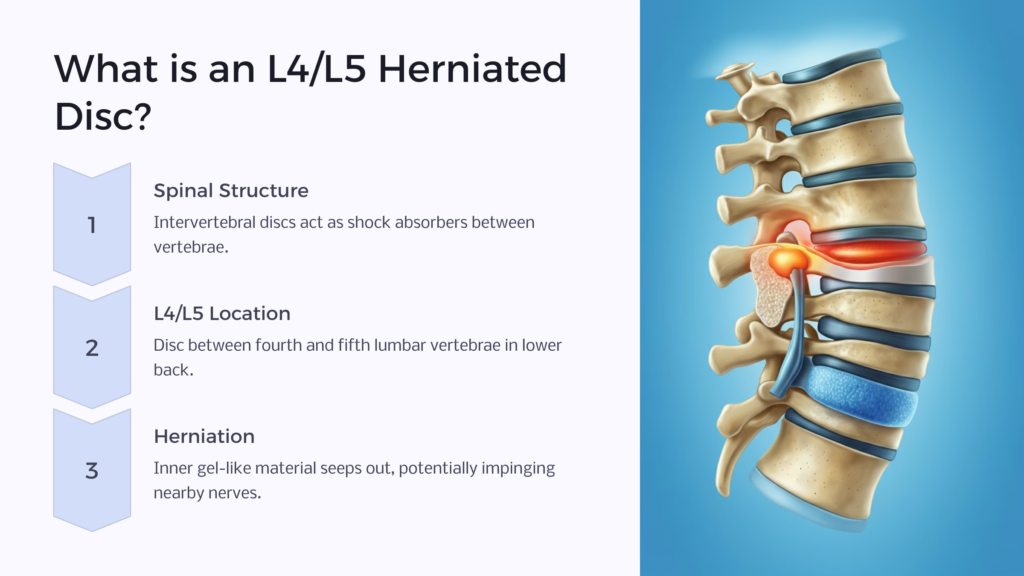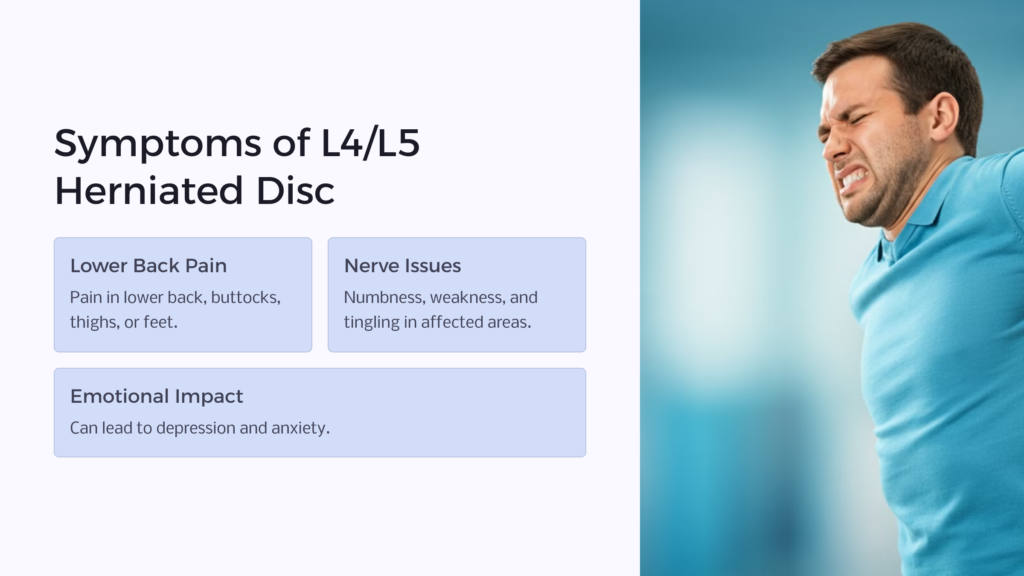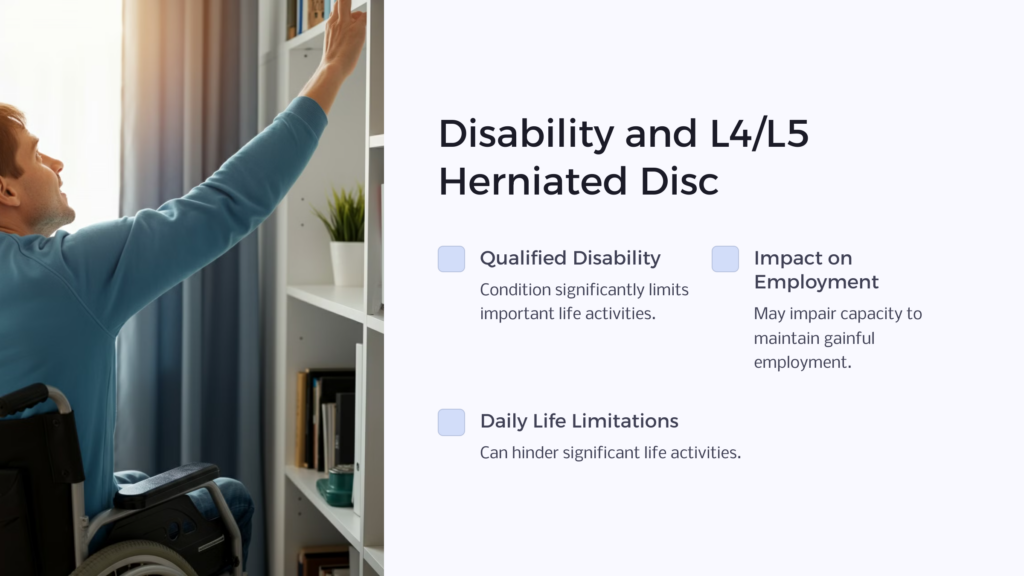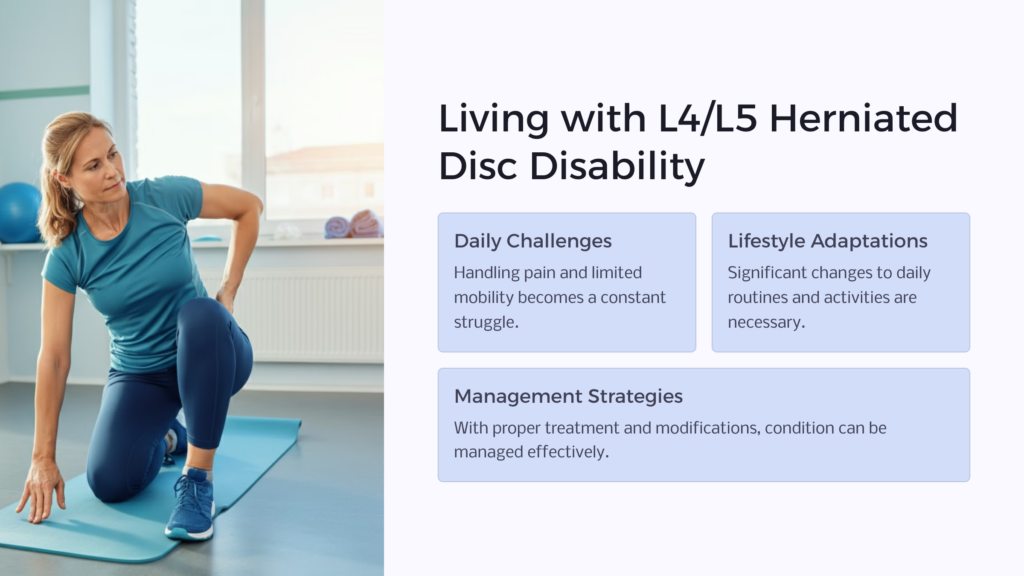A herniated disc, specifically at the L4/L5 level, is a common health issue that can result in significant physical discomfort and might limit everyday activities. The term “disability,” in this context, refers to a pronounced limitation in one’s ability to execute normal day-to-day tasks as a result of their condition.
Understanding L4/L5 Herniated Disc

The spinal column consists of various elements, one of which is an intervertebral disc that acts as a shock absorber between vertebrae. The ‘L4/L5’ notation denotes the disc between the fourth and fifth lumbar vertebrae, in the lower back. When this disc herniates, the inner gel-like material seeps out through the outer layer, potentially impinging nearby nerves. The most common reasons for L4/L5 disc herniation include degenerative disc disease, acute physical trauma, or strain from heavy lifting or repetitive movements.
Symptoms of L4/L5 Herniated Disc

The physical symptoms associated with an L4/L5 herniated disc can vary greatly. Patients often report pain in the lower back, buttocks, thighs, or even down to the feet. Other notable signs include numbness, weakness, and tingling in the areas affected by the compromised nerves. As the intensity and persistence of pain increase, daily activities become more challenging, leading to evident constraints in mobility and routine tasks. The consistent struggle and pain of a bulging disc might also lead to emotional turmoil, such as depression and anxiety, adding another layer of complexity to the situation.
Diagnosis of L4/L5 Herniated Disc
Diagnosis of an L4/L5 herniated disc usually commences with a physical exam and a review of the patient’s medical history. Medical imaging, like an MRI or a CT scan, is often necessary to confirm the condition. Certain activities like bending, heavy lifting, or intensive physical work may worsen the condition and exacerbate symptoms.
Link between L4/L5 Herniated Disc and Disability

The condition of L4/L5 herniated disc, if severe and left untreated, can completely disrupt an individual’s mobility, hindering normal life activities. In such instances, the incapacitating effects might qualify as a disability due to its profound impact on the person’s capacity to work or engage in routine activities.
Treatment Options for L4/L5 Herniated Disc
The treatment options for L4/L5 herniated discs revolve around reducing pain, improving mobility and preventing further intervertebral disc damage. Therapeutics may involve physical therapy, oral pain relievers, and in some cases, surgery. Short-term solutions like analgesics offer temporary respite, but long-term solutions such as surgery or rigorous physical therapy may be necessary to resolve the underlying problem.
L4/L5 Herniated Disc as a Qualified Disability
A ‘qualified disability’ means that the condition significantly limits important life activities, warranting certain allowances under the law. A herniated disc can be considered such if it impairs the person’s capacity to maintain gainful employment or hinders significant life activities. Several cases have successfully claimed social security disability benefits due to a herniated disc.
Applying for Disability Benefits
Applying for social security disability benefits necessitates extensive documentation to validate the condition and its debilitating effects. This usually involves medical records, test results confirming diagnosis, and professional opinions from medical practitioners regarding the patient’s ability to work or perform routine tasks. Veterans with this medical condition may apply at the Veterans Administration to find their VA disability rating, determining benefit amount there.
Be sure that your disability claim includes proper medical documentation or medical evidence. If the claim is denied, you can appeal. If needed, find a disability lawyer to help strengthen your case. The disability determination services may give you a second chance at social security disability insurance.
Living with L4/L5 Herniated Disc Disability

Living with the disability caused by an L4/L5 herniated disc requires significant adaptations to the patient’s lifestyle. Handling pain and limited mobility becomes a daily challenge. Case studies show that with appropriate treatment and lifestyle modifications, patients have been able to manage their condition admirably.
Conclusion
In conclusion, an L4/L5 herniated disc is a medical condition that can result in disability, drastically impacting the affected individual’s capacity to partake in routine activities. The importance of seeking professional help and applying for deserved disability benefits cannot be overstated. Moreover, society’s understanding and support for those experiencing this are unequivocally crucial in their journey towards adaptation and recovery.
Take our quiz at Benefits.com to get started towards the benefits you deserve.
 Benefits.com Advisors
Benefits.com Advisors
With expertise spanning local, state, and federal benefit programs, our team is dedicated to guiding individuals towards the perfect program tailored to their unique circumstances.
Rise to the top with Peak Benefits!
Join our Peak Benefits Newsletter for the latest news, resources, and offers on all things government benefits.



















